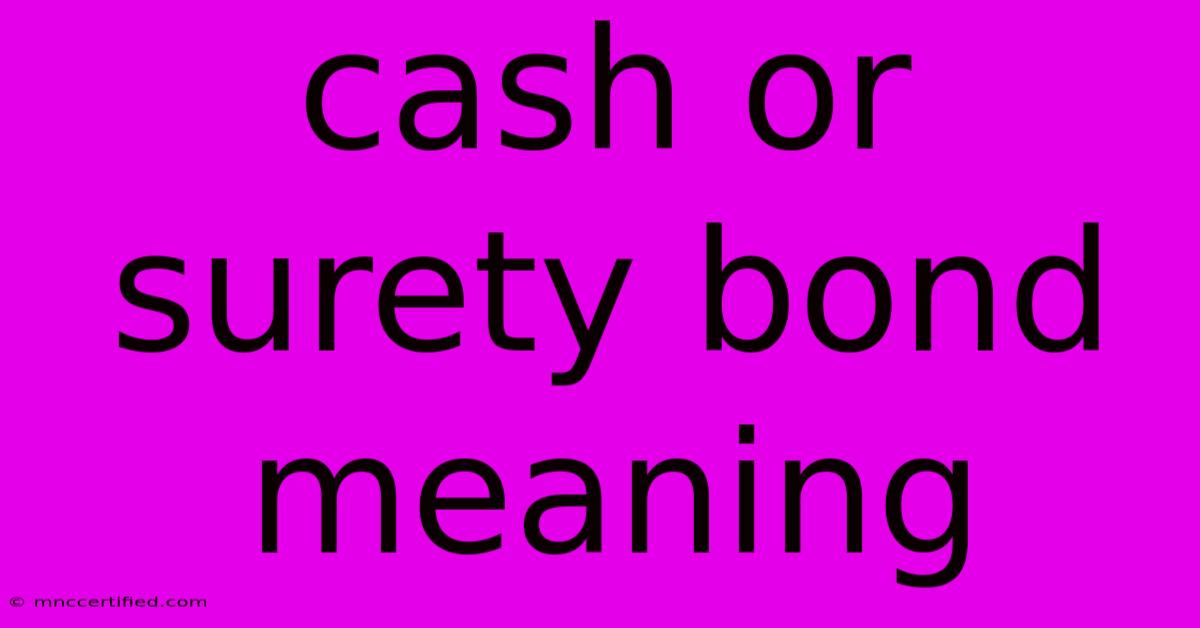Cash Or Surety Bond Meaning

Table of Contents
Cash or Surety Bond: What's the Difference and Which One Do You Need?
Choosing between a cash bond and a surety bond can be confusing, especially if you're unfamiliar with the legal system. Both guarantee the fulfillment of a financial obligation, but they function very differently. Understanding their nuances is crucial for making the right choice for your situation. This article will clarify the meaning of each type of bond, highlighting their key differences and helping you determine which is best for you.
What is a Cash Bond?
A cash bond is a straightforward method of securing a financial obligation. It involves depositing a specific amount of cash with a court or other designated authority as collateral. This cash is held until the obligation is fulfilled. If the obligation is met successfully (e.g., appearing in court, completing community service), the cash is returned to the depositor. However, if the obligation is not met, the court retains the cash as payment for the breach.
Key Features of a Cash Bond:
- Simplicity: The process is relatively simple and straightforward.
- Immediate Effect: The bond is immediately effective upon deposit.
- High Risk: The depositor faces the potential loss of the entire sum if the obligation is not met.
- Limited Interest: In most cases, there is little to no interest earned on the deposited cash.
When is a cash bond used?
Cash bonds are commonly used in criminal cases as bail, ensuring the defendant's appearance in court. They can also be required in other situations where financial security is necessary, such as contractual agreements or license applications.
What is a Surety Bond?
A surety bond, unlike a cash bond, involves a three-party agreement: the principal (the individual or entity needing the bond), the obligee (the party to whom the obligation is owed), and the surety (the bonding company). The surety company guarantees the principal's performance of the obligation. If the principal fails to meet the obligation, the surety company pays the obligee. The principal is then responsible for reimbursing the surety company.
Key Features of a Surety Bond:
- Lower Upfront Cost: You typically pay a smaller premium to the surety company, rather than the full bond amount upfront.
- Reduced Risk: You don't risk losing a large sum of money upfront.
- More Complex Process: Obtaining a surety bond involves an application and underwriting process.
- Credit Check Required: Surety companies assess the principal's creditworthiness before issuing a bond.
When is a surety bond used?
Surety bonds are commonly used in a wide range of situations, including:
- Construction contracts: Guaranteeing the contractor's completion of the project.
- Fidelity bonds: Protecting against employee dishonesty or theft.
- Court bonds: Similar to cash bonds but with less upfront financial risk.
- License and permit bonds: Demonstrating financial responsibility for obtaining a license or permit.
Cash Bond vs. Surety Bond: A Comparison
| Feature | Cash Bond | Surety Bond |
|---|---|---|
| Cost | Full bond amount upfront | Premium (percentage of bond amount) |
| Risk | High (potential loss of entire amount) | Lower (premium only, potential reimbursement) |
| Complexity | Simple | More complex (application and underwriting) |
| Interest | Usually none | None |
| Immediate Effect | Yes | Yes, after approval |
Which Bond is Right for You?
The best choice depends on your specific circumstances and financial situation. A cash bond is suitable if you have the necessary funds readily available and prefer a straightforward process, despite the higher financial risk. A surety bond, however, is more advantageous if you need to minimize upfront costs and are willing to navigate a slightly more complex application process. Your credit score also plays a significant role in obtaining a surety bond.
Consider consulting with a legal professional or financial advisor to determine which type of bond best suits your needs. They can help you understand the complexities involved and guide you toward making an informed decision. Remember, understanding the meaning and implications of each bond type is crucial to ensuring your financial security and successful fulfillment of your obligations.

Thank you for visiting our website wich cover about Cash Or Surety Bond Meaning. We hope the information provided has been useful to you. Feel free to contact us if you have any questions or need further assistance. See you next time and dont miss to bookmark.
Featured Posts
-
Host Home Provider Insurance
Dec 01, 2024
-
Erie Insurance Lower Burrell
Dec 01, 2024
-
Live Toluca Vs America Semifinal
Dec 01, 2024
-
Florida Gators Win 31 11 Victory Over Fsu
Dec 01, 2024
-
Catholic Church Donation Fuels Political Debate
Dec 01, 2024